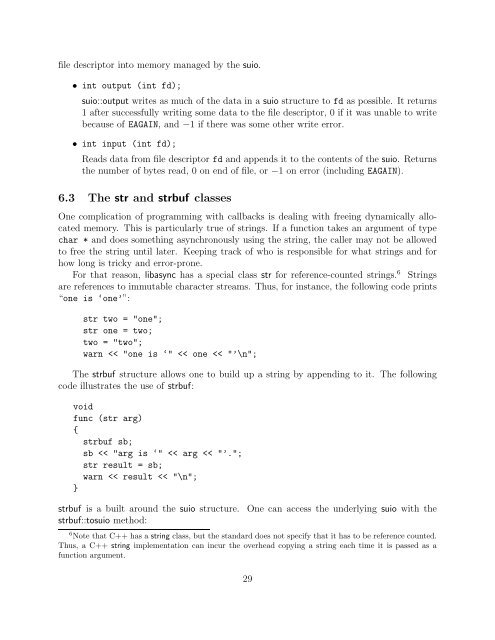Using TCP Through Sockets
Using TCP Through Sockets Using TCP Through Sockets
• size_t resid () const; Returns the total number of bytes in the iovec array. As an example, the following shows a rather convoluted function greet (), which prints the words “hello world” to standard output. It behaves correctly even when standard output is in non-blocking mode. void writewait (int fd) { fd_set fds; assert (fd < FD_SETSIZE); FD_ZERO (&fds); FD_SET (fd, &fds); select (fd + 1, NULL, &fds, NULL, NULL); } void greet () { char hello[] = "hello"; char space[] = " "; char world[] = "world"; char nl[] = "\n"; } suio uio; uio.print (hello, sizeof (hello) - 1); uio.print (space, sizeof (space) - 1); uio.print (world, sizeof (world) - 1); uio.print (nl, sizeof (nl) - 1); while (uio.resid ()) { writewait (1); int n = writev (1, uio.iov (), min (uio.iovcnt (), UIO_MAXIOV)); if (n < 0 && errno != EAGAIN) fatal
file descriptor into memory managed by the suio. • int output (int fd); suio::output writes as much of the data in a suio structure to fd as possible. It returns 1 after successfully writing some data to the file descriptor, 0 if it was unable to write because of EAGAIN, and −1 if there was some other write error. • int input (int fd); Reads data from file descriptor fd and appends it to the contents of the suio. Returns the number of bytes read, 0 on end of file, or −1 on error (including EAGAIN). 6.3 The str and strbuf classes One complication of programming with callbacks is dealing with freeing dynamically allocated memory. This is particularly true of strings. If a function takes an argument of type char * and does something asynchronously using the string, the caller may not be allowed to free the string until later. Keeping track of who is responsible for what strings and for how long is tricky and error-prone. For that reason, libasync has a special class str for reference-counted strings. 6 Strings are references to immutable character streams. Thus, for instance, the following code prints “one is ‘one’”: str two = "one"; str one = two; two = "two"; warn
- Page 1 and 2: Using TCP Through Sockets David Maz
- Page 3 and 4: eturn; } while ((nread = read (fd,
- Page 5 and 6: general, a client wishing to create
- Page 7 and 8: #define FINGER_PORT 79 #define bzer
- Page 9 and 10: they will operate). Following the b
- Page 11 and 12: • int execl(char *path, char *arg
- Page 13 and 14: } close (s); return -1; } return s;
- Page 15 and 16: } } if (cs < 0) { perror ("accept")
- Page 17 and 18: select represents sets of file desc
- Page 19 and 20: • void cb_add (int fd, int write,
- Page 21 and 22: * Make file file descriptor nonbloc
- Page 23 and 24: } xfree (fc->host); xfree (fc->user
- Page 25 and 26: fc->fd = socket (AF_INET, SOCK_STRE
- Page 27: libasync also provides three classe
- Page 31 and 32: Sometimes you want to do something
- Page 33 and 34: Note the only way to generate point
- Page 35 and 36: • void tcp_nodelay (int fd) sets
- Page 37 and 38: } switch (buf.tosuio ()->input (fd)
file descriptor into memory managed by the suio.<br />
• int output (int fd);<br />
suio::output writes as much of the data in a suio structure to fd as possible. It returns<br />
1 after successfully writing some data to the file descriptor, 0 if it was unable to write<br />
because of EAGAIN, and −1 if there was some other write error.<br />
• int input (int fd);<br />
Reads data from file descriptor fd and appends it to the contents of the suio. Returns<br />
the number of bytes read, 0 on end of file, or −1 on error (including EAGAIN).<br />
6.3 The str and strbuf classes<br />
One complication of programming with callbacks is dealing with freeing dynamically allocated<br />
memory. This is particularly true of strings. If a function takes an argument of type<br />
char * and does something asynchronously using the string, the caller may not be allowed<br />
to free the string until later. Keeping track of who is responsible for what strings and for<br />
how long is tricky and error-prone.<br />
For that reason, libasync has a special class str for reference-counted strings. 6 Strings<br />
are references to immutable character streams. Thus, for instance, the following code prints<br />
“one is ‘one’”:<br />
str two = "one";<br />
str one = two;<br />
two = "two";<br />
warn



